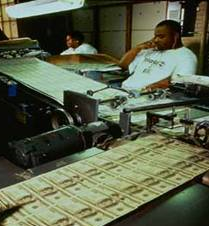Tax credit to reduce greenhouse gases doesn’t

Paper mill
The intent of the law was to encourage alternative fuels, and reduce dependence on products like diesel that result in greenhouse gases. But the paper companies figured out how to get paid to do the opposite:
The origins of the credit are innocent enough. In 2005 Congress passed, and George W. Bush signed, the $244 billion transportation bill. It included a variety of tax credits for alternative fuels such as ethanol and biomass. But it also included a fifty-cent-a-gallon credit for the use of fuel mixtures that combined “alternative fuel” with a “taxable fuel” such as diesel or gasoline.
Enter the paper industry. Since the 1930s the overwhelming majority of paper mills have employed what’s called the kraft process to produce paper. Here’s how it works. Wood chips are cooked in a chemical solution to separate the cellulose fibers, which are used to make paper, from the other organic material in wood. The remaining liquid, a sludge containing lignin (the structural glue that binds plant cells together), is called black liquor. Because it’s so rich in carbon, black liquor is a good fuel; the kraft process uses the black liquor to produce the heat and energy necessary to transform pulp into paper. It’s a neat, efficient process that’s cost-effective without any government subsidy.
The paper companies figured out that if they add diesel to the black liquor, voila, a fuel mixture that qualifies for the mixed-fuel tax credit.
“You use the toilet every day,” said one hedge fund analyst who’s been closely following the issue. “Imagine if you could start pouring a little gasoline into the bowl and get fifty cents a gallon every time you flushed.”
No one in Congress seems to have anticipated this creative maneuver. This past fall the Joint Committee on Taxation computed the cost of extending the tax credit for three months and projected it would cost a manageable $61 million. It now appears that the extension (which was passed as part of the TARP) could cost as much as $2 billion before the credits expire at the end of this calendar year.
And yet, because the paper industry has invested in lobbying, and now has even more incentive to do so, Congress will probably not repeal this law before it expires.
HT: Greg Mankiw

Add A Comment